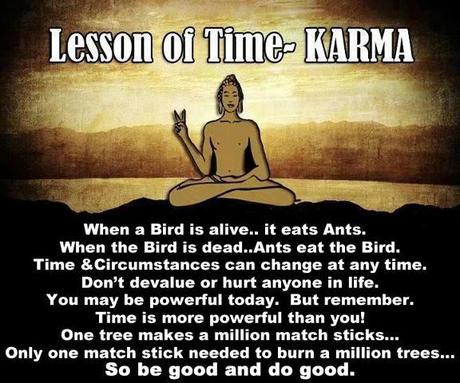
Remember I referred to the Karma Theory in my post about the Bhagavad Gita? Well, today is Day 11 of the #AtoZChallenge and we are at the letter K. I was going to write about Kindness, one of my favorite practices. Then I remembered the Karma Theory, which was playing on my mind, and I decided to write about it.
Feel like reading a post on Kindness in real life? Here it is: A Shower of Kindness
The Karma Theory
To me, the Karma theory can be summed up in one line:
As you sow, so shall you reap
or
What goes around comes back around
The Hindu scriptures refer to the karma theory frequently in the context of desire being the root cause of all our suffering. (Did you just feel you’ve heard this before? Buddhism refers to this too!). We are cautioned against any action inspired by our desires. Also, the karma theory is impartial and includes every being, regardless of status – and that includes the Gods.
So – we can broadly refer to Karma as “action”
We have to face the consequences (good or bad) of our actions (good or bad). Duh!

Source: Facebook.com
The basis of the karma theory is around cause and action. Our actions are responsible for our karmic consequences. So does it mean that by inaction we can resolve the problem? No. Non-action is not the answer, since according to karma, we cannot live in a vacuum. So maybe it looks like we’re doing nothing, but we’re living beings and are busy breathing and thinking as all those other activities like digestion, blood circulation, etc. happen inside us. All this counts as action.
The point is, action, per se, is not the problem. What is crucial is the attitude with which we do something…and the context. It follows from this that good actions may not always result in good results. Am I making sense? On the battlefield, killing is bravery whereas on the street, killing someone is a crime. So it all depends on why we do something, and in what context.
If our action is the result of ego and focused on the result, it leads to suffering and we get embroiled in the vicious cycle of life and death.
The Bhagavad Gita emphasizes this.
What is the answer?
Happily the Bhagavad Gita also has the answer: Letting go of outcomes and focusing on duty.
So – if you believe in the karma theory does it mean you are pessimistic?
No. Those who truly believe in the karma theory tend to lead a responsible life, taking ownership of their life and actions and their outcomes.
They will not:
- Crib
- Pass the buck
- Play the blame game
- Expect others to bail them out
- Act like victims of their circumstances
- Victimize others
A believer of the karma theory will find solutions to the problem rather than complain and blame someone else.
Instead, they become:
- More sensitive
- More mindful
- More ethical
- More positive
- More optimistic
- More likely to heed their conscience
- More focused on doing good
- Aware that the past is past and the present matters
So – whatever we experience is a result of our “Karma” – our actions. And for what doesn’t work out – the Karma theory is a nice cushion.
Do you agree? What are your thoughts on the Karma Theory?
Good Karma
The Letter K is also for Ken Wert, a dear friend and blogger and founder of “Meant to be Happy“. Ever insightful, he presents his wisdom with a good dose of humor. It is my good Karma that I know him. I’ve had the honor of having him guest post here. Please visit his blog. Inspiration guaranteed.

Today, I recommend
Laxmi’s blog - K is for Kiddo
Pallavi’s blog – K is for Kindly Keep Quiet
Pheno Menon’s blog – K is for Kite in the Sky
*****
“There is no need for temples, no need for complicated philosophies.
My brain and my heart are my temples;
my philosophy is kindness. ” Dalai Lama
******
*****

